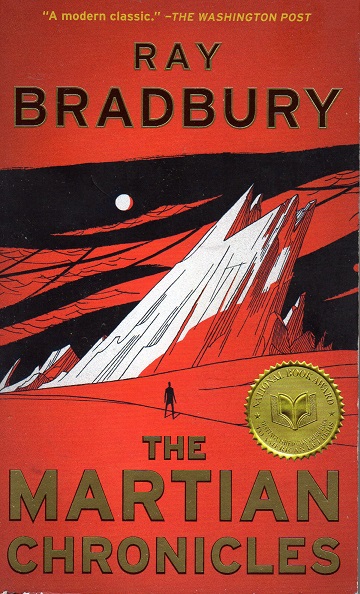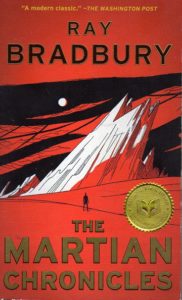Book Review: The Martian Chronicles by Ray Bradbury
Once, Mars was a place of mystery. Humans looked at it from the blue Earth with feeble telescopes, and imagined what life, if any, might inhabit that red dot in the sky. Were there canals filled with water? Bloodsucking tripod operators? Beings that had never fallen from grace with God? Ray Bradbury looked, and imagined stories of Martians and Earthlings, and the doom of both.
Several of the stories in this volume were written in the latter half of the 1940s, and then connected with interstitial material in 1950 to make a chronological narrative. The book opens with “Rocket Summer”, when a January 1999 Ohio winter is interrupted with heat from exhaust tests on the launchpad. It ends with “The Million-Year Picnic” as refugees from war-torn Earth arrive on Mars in October 2026, and see the new Martians. In between is the coming and going of the human presence on Mars.
The first three expeditions to Mars all die; perhaps if the U.S. government hadn’t outlawed science fiction and fantasy (but apparently not religious texts) in the 1970s, they would have been better prepared. But they get posthumous revenge; in a nod to H.G. Wells, by the time the Fourth Expedition arrives, the majority of Martians have been killed off by a common Earth disease.
Wave after wave of Earthlings arrive, most of them from the United States, as it monopolizes the construction of interplanetary rockets. In the story “Way in the Middle of the Air”, the entire black population of the Southern U.S. decamps to Mars. (in this bleak future, race relations did not advance beyond the early 1950s; poll taxes have only recently been abolished as of 2003. and the Klan is still very active.) One particularly virulent racist panics when he realizes he will soon not have African-American people to oppress! There’s use of the N-word and other racist language, so this story is sometimes left out of school editions of the book. Because of the stitched-together nature of the collection, this large population of emigrants is never mentioned again, and their fate is finally revealed in a completely different short story collection.
Eventually, once the early settlers have made the place relatively safe, the moral guardians who eradicated speculative fiction on their homeworld arrive to make Mars just as joyless. “Usher II” has a multimillionaire who is still hopping mad about their destruction of his library take revenge in inventive ways mostly inspired by Edgar Allan Poe. Mr. Bradbury was tangentially involved with the comic book industry, which was undergoing the attacks (“think of the children!”) which would lead to the Comics Code. He would return to the theme of book burning in Fahrenheit 451. As a kid I could easily imagine boring grownups banning all the good stuff.
Eventually, atomic war breaks out on Earth, and most of the population of Mars returns to that planet in a probably vain attempt to help out their relatives or home nation. “The Silent Towns” concerns one of the very few people left, a miner who’d been up in the hills without communication for a few weeks when everyone else took the rockets home. He’s initially thrilled when he learns there’s a young woman also still on Mars, but isn’t pleased when he actually meets her.
Some of Bradbury’s stories from this time period showed a nasty streak of misogyny, and this is one of them. Genevieve stayed on Mars because she’d been constantly bullied about her weight, but rather than treat her sympathetically, the narrative flow treats her as a gross monstrosity for daring to be fat, and indulging herself in ways roughly equivalent to those Walter had done earlier in the story. Walter escaping and hiding from her for the next twenty years is treated as a happy ending.
“There Will Come Soft Rains” is also included in this collection, one of the most perfect short stories ever written. After the atomic war on Earth, we look at the last day of a “smart house” that hasn’t quite figured out that all the humans in its city are dead.
One of the interesting things about the stories is that in the early ones, while the Martians are still flourishing, we see their petty sides and moral failings; but after they have mostly died off, those fall by the wayside and their great accomplishments and gentleness are emphasized.
Ray Bradbury really does have a gift for poetic turns of phrase, and his nostalgia for Midwestern small towns shines through. Sometimes the poetry can get in the way of comprehensibility, or become self-indulgent, dragging on for a paragraph or two too long. And of course, he made no attempt to be scientifically accurate even to what was known about Mars back in the day–he readily admitted that the stories were really fantasy.
Several of the stories were adapted for EC Comics, and there have been some television show versions as well.
The book is certainly well worth reading at least once, even if it will not be to everyone’s taste.


